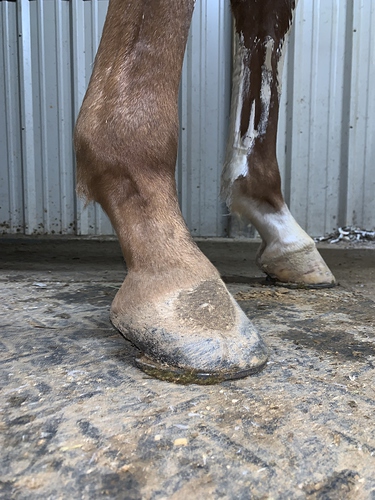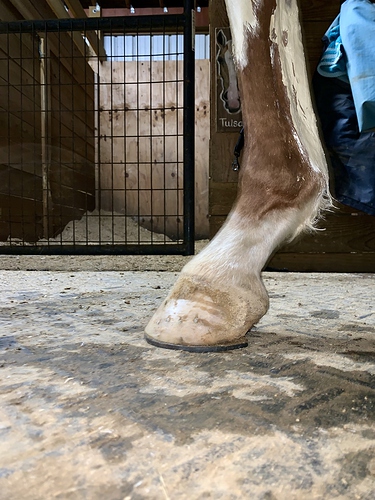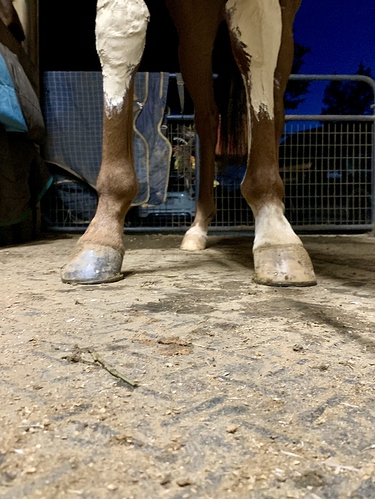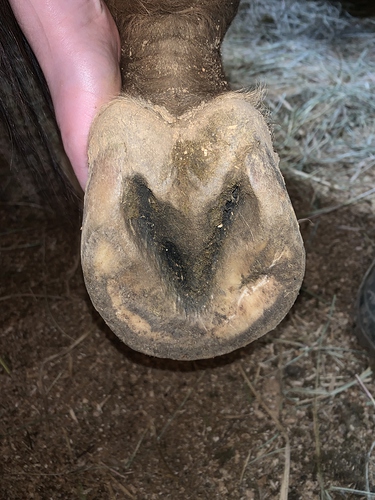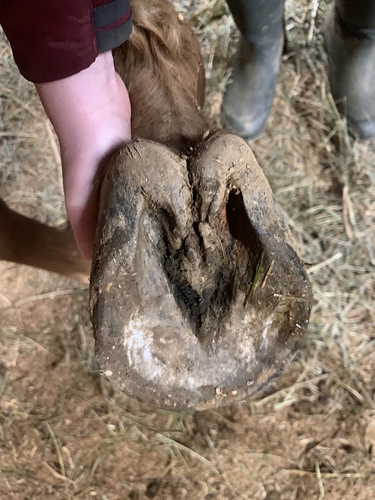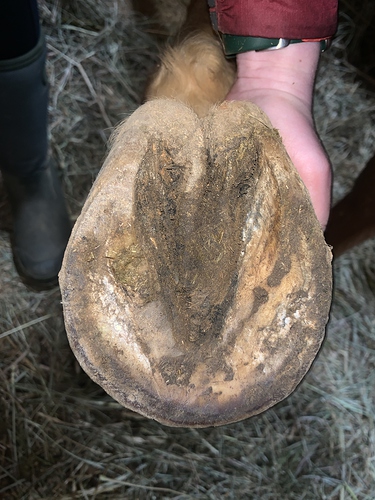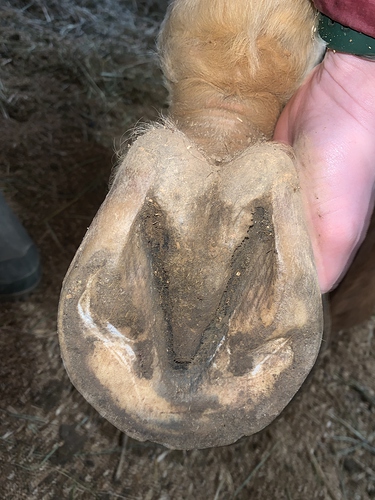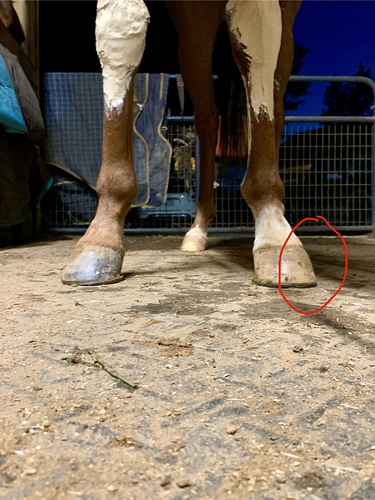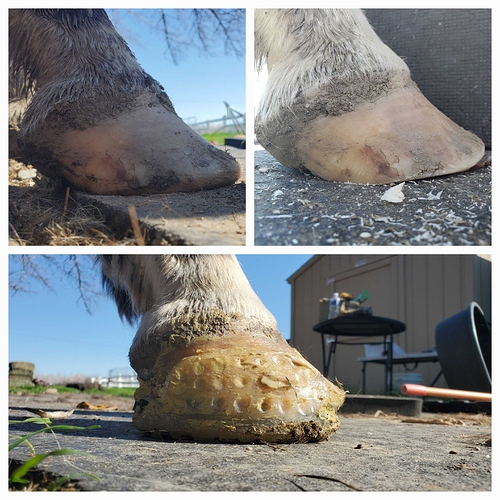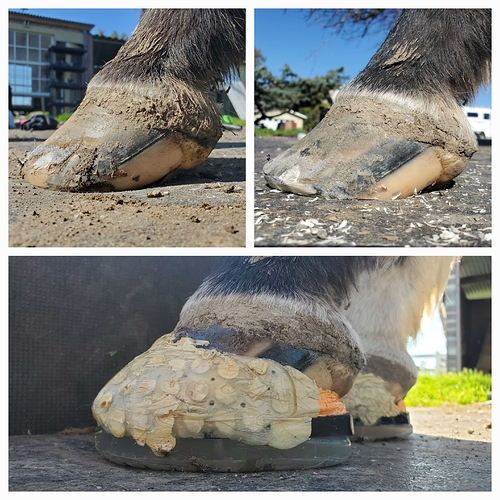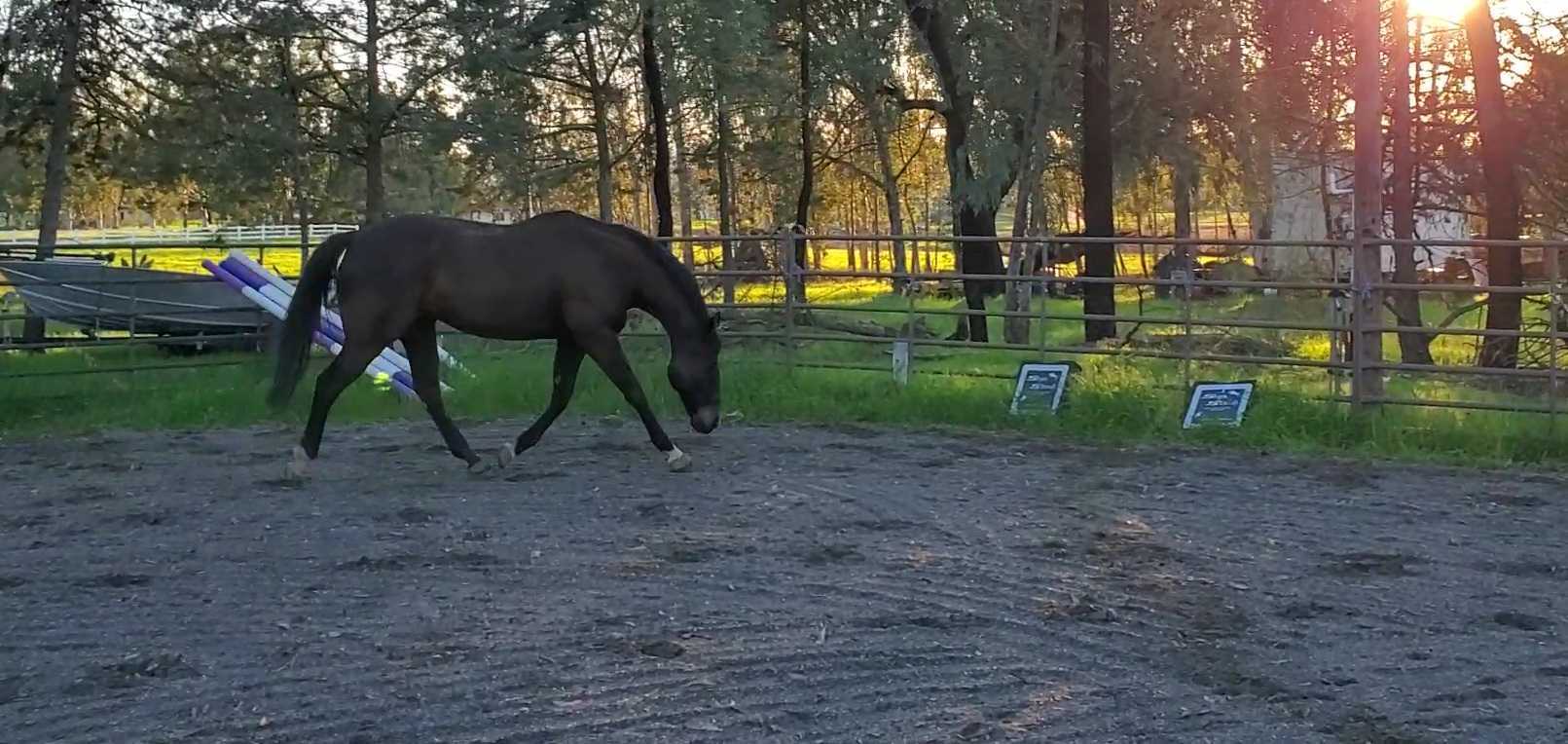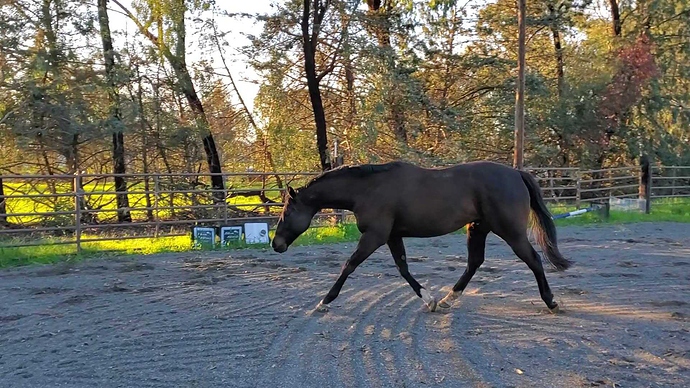Seconding this. I know looking for a new farrier is such a PITA (I’ve gone through double digits at this point). Hopefully the guy from the rehab barn can recommend someone closer or someone who travels to you. Also echoing again that a 5 week cycle would likely be beneficial (I don’t remember seeing what his current cycle is).
This is going to sound like an excuse - but pretty much that didn’t pan out when I last asked. But I can ask again. He’s also likely to retire any day  . I did get a suggestion here for someone in the next county, I just haven’t reached out yet to see if he comes this way.
. I did get a suggestion here for someone in the next county, I just haven’t reached out yet to see if he comes this way.
Exactly! I work full time in-person M-F, and don’t get enough PTO to burn it all on farrier days. Besides, while the rehab barn farrier was usually right on time, a rescheduled appointment could put me out tons of time and gas and potentially push us out WEEKS. Or I’d need to board the horse at the rehab barn for a day or two every month (that’s not really what’s best for this horse).
This one isn’t my only horse, either. I need good feet for everything, and hauling the whole crew to a farrier each month just isn’t in the cards. Additionally, while we have no plans to move YET, we are renting and reality is no job is a permanent career anymore. This WILL come up again, even if I have the best farrier in the world.
5-6 weeks. I prefer 4, but that would put us off kilter from the rest of the barn and we aren’t exactly in a hotbed here of farriers.
Bonus points for learning to do this, I can keep up with it somewhat to get to the next trim.
Of the Vettec glues, I agree that SuperFast is better than Adhere. It seems like a lot of folks find the glue that works best for them and stick with it, which I totally understand! Does the guy who does barefoot/glue ons use shoes with an indirect application (attached to the wall–glue on boots, versa glues, scoot skins) or is he gluing directly to the sole (Eponas, some duplos, some metal shoes)? I try to avoid direct (sole) applications whenever possible because the risk of failure is so much greater, the prep is way harder, and overall I just hate it lol. When done right it’s a fantastic tool but it is so much finickier.
Using something like Equipak can also help with the bond for sure–since it bonds to both the sole and the shoe, it can help keep things tight. Not always and not for sure but it can.
I’ve stopped using Adhere entirely–it’s all I started out using, but I had a lot of failures, more hoof wall issues, etc. For whatever reason SuperFast does seem to bond better than Adhere and is less brittle. These days my order of preference is generally superglue, Equilox, SuperFast–I like the work time Equilox gives me, but it is more expensive and I can’t pick it up at my local feed store. So if I’m out I’ll use SuperFast. They’re all good products, IMO, and everyone will have personal preference, but I’ve found it helpful to have all three in my arsenal because each one shines a bit differently.
Totally understand the PTSD! Glue has definitely come a long way, but it’s still not a perfect science, and so much of it comes down to prep and environment. There is some guesswork and sometimes a bit of luck involved. I think the new products on the market and coming on the market are absolutely incredible, but it will take time for the market to adapt and I think there will always be a place for steel and nails.
I hear you. Sometimes there’s just…nobody else.
Personally, I think it’s worth seeing what the current farrier can do in terms of trims, with the knowledge that you may need to make some tweaks before gluing. Not ideal, but worth a shot. The September '23 pictures really aren’t awful IMO. Are they as good as April? No, but they’re not a horror show, either. The biggest thing will be the hinds, which I suspect can have more toe taken down. Personally I’d try that before hauling an hour and dealing with the logistical challenges that entails. It could also slowly transition into you doing them yourself entirely without having to make the leap right off the bat.
The barefoot / glue on guy doesn’t use metal shoes of any kind. He does use a few different glue on types, but I am not sure of the names. They all have some sort of wall attachment (some look like a complete cuff around the foot, others mostly with some big clip type things). I think he does some direct glue application as well as indirect. Some of them have a complete sole tread from what I can see…I think those are the ones he tends to put Equipak in also. Most of the horses he works on are some sort of long term rehab case like coming back from super high/low problems, prolapsed rear foot, etc.)…basically the guy the OP needs only several thousand miles away. He is the one who suggested SuperFast when I was having such a hard time with Adhere.
My farrier will also do Polyflex. If it wasn’t so ungodly expensive, those would be super appealing to me for a few reasons. But it’s like buying the horse a pair of Parlanti’s every 4 weeks….he charges a PITA fee  for those for sure.
for those for sure.
I have this posted on the Forrest thread, but my new guy is super footsore without shoes but can’t seem to keep them on either - he’s the one that showed up in January with plates on from September. I’m going back and forth about trying shoes + pads on him vs opening the boots/glue ons can of worms for TWO horses at the same time 
Here’s his current state (plus a cycle of growth and minus shoes  )
)
He’s borderline a SoftRide boot candidate, if I can shuffle his turnout to something drier (not an option with the original subject of this thread).
Ugh!
Did you do any X-rays when you bought him? It’s concerning that he is that sore when he still has sooo much extra hoof.
Not of his feet. They were pretty bad, and I offered to get some but was told by my team that they weren’t needed yet.
To be fair, they’re bruised to hell and the frogs are in terrible shape. I’m half waiting for him to blow an abscess on that front (they often do - we don’t get a ton of abscesses here despite the mud knock on wood, but you never know with new ones coming in).
It’s the shoe pulling that makes me wonder what would be best for him. I’d hate to lose what good wall we have by yanking it all off every week. Hopefully with angle correction that’ll stop.
In your situation, I would cast and get him on a shorter trim cycle to help those feet reshape/rebuild a little quicker. Cast for two weeks, rasp and shape, cast, rasp, etc - repeat for a couple of months until things dry out and then see if you can manage him barefoot (with or without boots) or if the underlying hoof is then ready for shoes. I’d personally keep him barefoot for as long as possible, but I know it’s a very personal decision. I’m nowhere as knowledgeable as some folks in this thread, but I like to think I have good instincts and it’s not my first rodeo managing ouchy TB feet. 
Left front - is that gigantic ridge/dip/whatever you want to call it at the cornet band real, or just a weird photo angle? I see it in two pictures.
I’d get xrays asap.
Oh good. Whew!!!
Not to hijack this thread, but my farrier was just out and I picked his brain a bit about options. He gave me the green light to keep my mare (who has always been in shoes until we pulled them last fall ) barefoot and see how she does coming back into work. I’m ridiculously excited about this. If she does end up needing more support, he was totally on board with me doing the glue ons myself after he trims. He didn’t like the idea of casting for additional support. He has used them a ton with a lot of success for rehab situations, but doesn’t think they’re a good idea for performance horses - too rigid and not enough shock absorption for jumping, in his opinion. Anyway, thought it was interesting enough to share with the hive! I’m pretty thrilled that shoes aren’t yet in my immediate future.
Ooooo if you end up going down that road, keep me/us posted! If only for educational purposes.
I have a horse who has been in the EasyShoe Octo’s since late summer and is doing really well in them, however, I don’t know that I’d want to deal with removing/applying them myself. My farrier always has to make adjustments and remove excess dried glue to ensure they get a good stick upon reapplication. In my case, the mare has all white feet (paint horse problems) and was ripping her front shoes off along with hoof wall. Her hooves are too sensitive to not be in some sort of protection, but they’re also too fragile for regular shoes. We haven’t had issues with the glue on shoes coming off.
Though, there’s another horse in my barn whose glue on shoes only last 5-6 days per cycle. He rips them off like it’s his job. Not sure what makes the difference - same farrier, same program, etc.
Good luck in whatever you choose!
At the risk of opening myself up to a gajillion different kinds of criticism, I wanted to share these as encouragement. They’re not beautiful (I don’t pride myself on my glue work being beautiful, I pride myself on them staying on and the horse being comfortable, lol. For beautiful I prefer Octos, I’m much better at making them prettier, but on this day I only had Versa Glues in this horse’s size, and he’s my own and they’re covered in mud anyway so I don’t have to look too much) but they’re an ongoing work in progress and the horse is so comfy. I haven’t taken courses in gluing, all that I’ve learned has been trial and error and trawling through online resources to see what other folks are doing, taking what works and leaving what doesn’t. I was forced to step up due to lack of remotely adequate hoofcare and it has been incredibly rewarding. If I can do it, so can you. Yes, it’s been frustrating and sometimes expensive and there have been tears and blood and SO much swearing. But it’s worth it.
This horse came off the track with some of the most horrific feet I’ve ever seen. He has a ton of P3 remodeling and bone loss. It’s been ages of experimenting with what makes him comfy, trying to chase the toe, back up the heels, two steps forward one step back. His soles are sad and his wall just flares and goes splat rather than growing upwards. I’m feeling fairly optimistic about the direction we’re going right now but I’m taking it just a cycle at a time. Winter is especially hard with him but I really like how he’s doing in this package even with the mud and muck.
Top left is pre-trim, immediately after removing casts that had been on for a week because I needed to get something on him, didn’t have any shoes that fit him, and the forecast was predicting several inches of rain. I don’t have anywhere covered to glue so I needed to get something on ASAP. You can see plenty of dried mud, I’ve wire brushed most of it off. Top right is post-trim, before buffying. Bottom is post-glue. Again, they’re not beautiful, I know there’s glue everywhere! I’d like to see them set back a little further, next time I will heat fit the cuffs a bit more to get closer to 50/50 around COR.
But ultimately, ugly though they may be, he’s moving like this in them, his back is comfy, he’s running and bucking and playing in the field with his friends, shoes are still on strong two weeks later, I will probably pull and reapply next weekend:
It’s a steep and daunting learning curve, but it really is worth it IME.
Well done! I can see why you were desperate to get SOMETHING on him. It’s wonderful that you’ve found something that works for him. I’m hoping mine can stay barefoot, but I will definitely go this route if I need to. There’s nothing I love more than being self-sufficient when it comes my horses. My farrier today was like, “you just need to learn how to trim and you’ll be all set.” That’s my new goal!
Wow he looks comfy!!
Question: are you using some sort of wedge or pad between the shoe and his foot?
I’m gonna chat with the farrier this weekend and see if we can make a plan for both of these horses. I’d like them both barefoot, ultimately, but we shall see.
Yep! The black pads you see are Scoot Boot 3* Wedge Pads. I cut them to fit the shoe, then cut out the center to build essentially a rim pad to build height but relieve pressure on P3, then superglued the pad to the shoe. I don’t have a picture of it pre-attached to foot but I’ll grab one from the gal I got the idea from when Facebook is back online. Filled it with Luwex Premium Sport Hoofpack (the orange stuff) but any soft DIM will do.
I like the Scoot Pads because they squish down a bit, but last well enough to be reusable. I’ve had this horse in Versas with the rocker attachment, which he likes, but have been trying to find ways to slowly get him back to a flat application. Attempts with squishier pads like the EasyCare comfort pads or thinline hoof pads weren’t enough for him, and the versa wedges that you can attach to the shoe were too hard and caused some bruising in his heels. He’s been super pleased with the scoot pads so I’ll be sticking with these and hopefully graduating down to their flat pads as his feet develop.
About 50% of the horses I have in glue don’t have any pads, just DIM (if using Versas, if using 3Ds I don’t pack with anything). The others like some squish of some sort…my wonky chestnut OTTB loves thinline pads in his versas. I just buy the saddle fit shims because I can get six+ pads out of it for ~$50 vs two pads for $17.
The “ingredients” in the pictured foot: Artimud mixed with some copper sulfate (bc it’s muddy, during drier weather I just use plain Artimud) smeared liberally all over the foot, especially in CG and over frog. Luwex Premium Sport (mixed with some copper sulfate). Scoot Boot 3* Wedge pad, center cut out. EasyCare Versa Grip Glue with the plug glued in. Equilox acrylic glue.
For the next shoeing I will be doing these with Octos because they’re less messy and less expensive.

